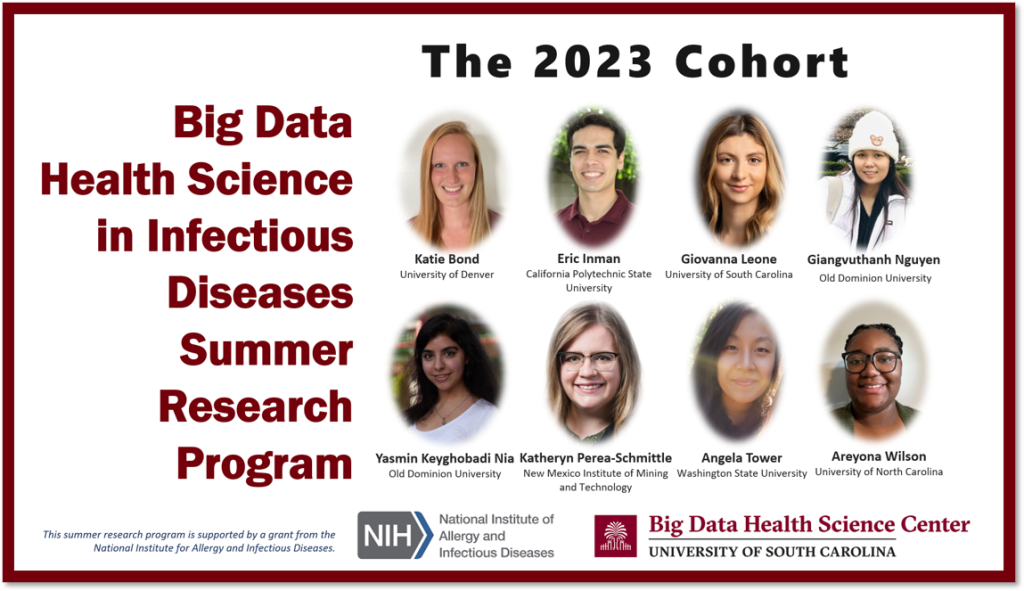The University of South Carolina (USC) Big Data Health Science Center (BDHSC) continues to contribute to workforce development through its National Institutes of Health (NIH)-funded Ruth L. Kirschstein National Research Service Award (NRSA) Short-Term Institutional Research Training Grants (T35). Studies show the existing shortage of data scientists in healthcare research and operations is growing, with demand already outstripping supply by 50–60%. This shortage is further exacerbated by the high demand for the same talent by healthcare providers, payers, and other industries. Recognizing this shortage, the health care industry needs academia to reengineer its curriculum to focus on using big data analytics.
The BDHSC believes that it is essential to engage current students early and provide new and innovative training opportunities to generate interest in the biomedical, social and behavioral, and clinical sciences as the nation works on cultivating a thriving and talented pipeline of next generation scientists. The BDHSC offers a 10-week summer research training program titled “Big Data Health Science in Infectious Diseases,” targeted towards predoctoral students in physical and/or quantitative sciences from across South Carolina and the United States. It is designed to introduce master’s and pre-dissertation doctoral students to the challenges and excitement of data science research by providing a mentored summer research experience with the aim of inspiring trainees toward academic careers that incorporate biomedical, behavioral, and clinical research. The program is led by a cadre of institutionally and nationally prominent principal investigators and program committee members: Bankole Olatosi, Neset Hikmet, and Xiaoming Li. Moreover, the training program involves active participation by accomplished and experienced multidisciplinary mentors with a comprehensive array of expertise. Students are thus paired with a mentor according to their interests and the mentor’s availability.
The program goes beyond the regular and traditional course of graduate studies by incorporating new courses, seminars, workshops, and collaborative activities during the summer. Furthermore, this training program aligns with the NIH’s first strategic plan for data science, issued in May 2018, which identified “workforce development” as one of its five goals for biomedical data science in the coming decades and called for integrative training in data-science approaches through curricula and mentored research. It provides an excellent opportunity for students to obtain training and significant exposure to research in an active laboratory conducting research related to ongoing NIAID-funded big data research projects that utilize one or more of five large existing data sources.

Each year, eight predoctoral students from the physical and quantitative sciences across the US are recruited to participate in the 10-week intensive summer training program. The 2023 summer cohort includes Katie Bond, University of Denver; Eric Inman, California Polytechnic State University; Giovanna Leone, University of South Carolina; Giangvuthanh Nguyen, Old Dominion University; Yasmin Keyghobadi Nia, Old Dominion University; Katheryn (“Kat”) Perea-Schmittle, New Mexico Institute of Mining and Technology; Angela Tower, Washington State University; and Areyona Wilson, University of North Carolina. The 2023 NIH T35 recipients’ research interests span a wide range of fields, including using computational approaches such as data science or machine learning to understand infectious diseases; using machine learning and deep learning and their applications in healthcare; integrating holistic approaches to assess and improve physical health and performance and reduce obesity; protein structure prediction and data science; microbial community analysis, molecular biology, genomics, and metagenomic analysis; applying mathematical modeling to study and further understand infectious diseases; phage therapy; and machine learning methods, the role of mathematics in data science.
The 2022 recipients of this summer research training program included Brendan Case, University of Vermont; Charles Dowling II, Claflin University; Shaelynn Frederick, Claflin University; Joshua Miles, University of Florida; Hannah Shead, Augusta University; Chelsea Spence, Clemson University; Jacob Stanley, University of South Carolina; and Jack Stavrakas, University of South Carolina.
